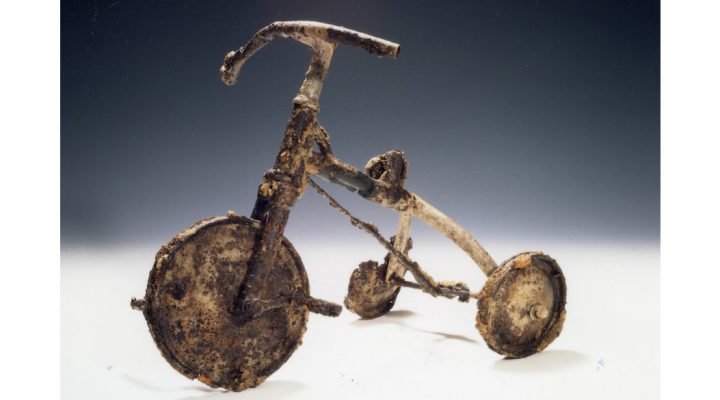With a prayer still hanging in the air — a prayer asking for their God’s protection and proclaiming their God’s blessing on their mission — young men boarded planes and launched themselves into history, killing thousands in cold blood who did not happen to share their religious beliefs, their culture, their homeland, their politics. They believed the killing of the innocent not only was justifiable, but that it was God’s holy will.
This is certainly true of the 19 hijackers of 9/11 infamy, who (in addition to senselessly sacrificing their own lives) murdered 2,977 innocent people. After their attack, several copies were found of a five-page handwritten document that seems to have been given to each of the attackers and seamlessly blended Muslim prayers with practical instructions on how to more effectively carry out their deadly mission.
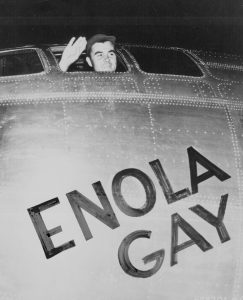
Col. Paul Tibbets, pilot of the Enola Gay, waving from its cockpit before the bomibing of Hiroshima, Japan.
It is also true of the crew members of the Enola Gay. On August 6, 1945, young men received a Christian blessing from a Catholic priest, Father George Zabelka, on the island of Tinian, boarded a plane and then proceeded to drop an atomic bomb on Hiroshima, slaughtering as many as 80,000 people in a single instant, 60,000 of whom were civilian non-combatants. By the end of 1945, more than 140,000 men, women and children in that single city — each a child loved by God and made in God’s own image — was dead because of a Christian prayer-blessed mission of butchery.
It is also true of the separate crew of young men who boarded the Bockscar on Aug. 9, 1945. Without allowing a devastated Japanese people an opportunity to grieve and bury their dead and to surrender, they also received a blessing from Father Zabelka before dropping a second atomic bomb on Nagasaki. This deliberate attack on a civilian target killed 150 Japanese soldiers while, in the blink of an eye, incinerating somewhere between 35,000 and 40,000 innocent men, women and children. By the end of the year, the total number of civilian dead caused by this particular flight into history would total 70,000.
“The older I get, the more I realize the concepts of terrorism and heroism are not nearly as concrete as we pretend them to be.”
The older I get, the more I realize the concepts of terrorism and heroism are not nearly as concrete as we pretend them to be. Quite the contrary, the line between “terrorist” and “hero” tends to get very blurry when examined too closely, seemingly turning not on religion, not on nationality, not even on a coldly calculated willingness to sacrifice thousands of civilians to a political cause but, rather, on our own personal viewpoint. On the simple, practical fact of whether the gun happened to be pointed at us, or by us, when it was fired. Or, to borrow from Professor Mark Juergensmeyer of UC-Santa Barbara’s Orfalea Center for Global and International Studies, “Whether or not one uses ‘terrorist’ to describe violent acts depends on whether one thinks the acts are warranted.”
For us, as Americans, it is easy to view the 9/11 hijackers as “religious extremist” terrorists, as wholly evil “others,” without ever stopping to consider whether, when viewed through a different lens than our own by someone standing in shoes that we never have worn, the 9/11 attacks could be seen as a somehow justifiable political response to United States imperialism in the Middle East (whether in terms of our first invasion of Iraq, our support of illegal Israeli settlements in the West Bank, or our ongoing military presence in Saudi Arabia).
“It is very hard for us to see ‘our’ Desert Storm as ‘their’ Pearl Harbor.”
We have much more trouble placing ourselves in the shoes of the families of the Japanese dead and in viewing our own prayer-sanctioned atomic bombings of Nagasaki and Hiroshima as acts of terror — as wholly unjustifiable deadly violence knowingly targeted at tens of thousands of civilians as a means of achieving our political and military ends. It is very hard for us to see “our” Desert Storm as “their” Pearl Harbor. Instead, the line between Taliban terrorist and Mujahideen freedom fighter seems to depend not on religion or on tactics, but on whether we personally approve of the target caught in the crosshairs.
Blaming 9/11 on “radical Islam” — and continuing to memorialize the event as an attack by evil Muslims on good Christians — lets us gloss over these difficulties and lets us ignore the real lessons the tragedy has to teach us: Life is sacred. The killing of a human being is evil, whether that person is a World Trade Center office worker or a Nagasaki child riding her bike to school; a murdered American embassy worker or an Iraqi housewife obliterated in a night of “shock and awe” bombardment glamorized on CNN.
“We seem unable to shake our absurd belief that war is the path to peace, opting to trust in bullets and bombs rather than our faith for our ultimate safety.”
As Christians, we worship a God whose kingdom demands that we beat our swords into plowshares and a Christ who has warned us that those who live by the sword will die by it. Still, we seem unable to shake our absurd belief that war is the path to peace, opting to trust in bullets and bombs rather than our faith for our ultimate safety.
Returning to the life of Father Zabelka, we can hopefully begin to glimpse the truth to be learned from our blood-soaked tragedies — both those we suffer and those we inflict — and to find a path forward for all, both “us” and “them.”
After hearing accounts of low-level damage assessment flights over Nagasaki in the days and weeks after the bombings he had blessed, Father Zabelka had his own “Damascus Road” experience.
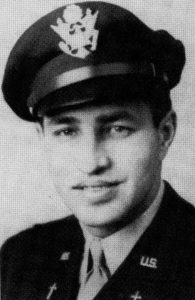
Father George Zabelka
In his own words, a minister who had been called to share the good news of a Christ of love and peace came to see clearly that war:
is not of Christ. It is not Christ’s way. There is no way to conduct real war in conformity with the teachings of Jesus. There is no way to train people for real war in conformity with the teachings of Jesus.
The morality of the balance of terrorism is a morality that Christ never taught. The ethics of mass butchery cannot be found in the teachings of Jesus. In Just War ethics, Jesus Christ, who is supposed to be all in the Christian life, is irrelevant. He might as well never have existed. In Just War ethics, no appeal is made to him or his teaching, because no appeal can be made to him or his teaching, for neither he nor his teaching gives standards for Christians to follow in order to determine what level of slaughter is acceptable.
Speaking not on an anniversary of the loss we suffered on 9/11, but rather on the 40th anniversary of our own wanton destruction of Hiroshima and Nagasaki, Father Zabelka did not mourn the presence of violent evil in the world. Instead, he grieved over a church complicit in the bloodshed, observing that “Christians have been slaughtering each other, as well as non-Christians, for the past 1,700 years, in large part because their priests, pastors and bishops have simply not told them that violence and homicide are incompatible with the teachings of Jesus.”
“It is a lie to say that learning to drive a bayonet into the heart of another is motivated from having put on the mind of Christ.”
Today, when Christian nationalists feel comfortable co-opting the image of the Cross in service of a violent attack on the Capitol and when the Franklin Grahams of the world persist in fanning the flames of hatred and violence with crowd-baiting cries of “radical Islam” rather than seeking understanding and peace, we should stop and listen to Father Zabelka’s words. Words that can only be spoken when bloodshed ceases, and repentance begins:
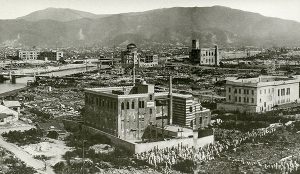
Hiroshima, Japan, 1945, atomic bomb aftermath
Today the world is on the brink of ruin because the church refuses to be the church, because we Christians have been deceiving ourselves and the non-Christian world about the truth of Christ. There is no way to follow Christ, to love as Christ loved, and simultaneously to kill other people. It is a lie to say that the spirit that moves the trigger of a flamethrower is the Holy Spirit of Jesus Christ. It is a lie to say that learning to kill is learning to be Christ-like. It is a lie to say that learning to drive a bayonet into the heart of another is motivated from having put on the mind of Christ. Militarized Christianity is a lie. It is radically out of conformity with the teaching, life and spirit of Jesus.”
Today we should rightly grieve with Christ the horrific, senseless murder of more than two thousand people on 9/11. While we do so, let’s merge our prayers of grief with prayers of repentance, asking the Prince of Peace to help us truly walk in his paths rather than persisting in the fool’s errand of trying to parse out the impossible question of where terror ends and heroism begins.
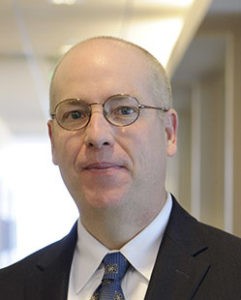
Chris Conley
Chris Conley is an attorney and graduate of the University of Georgia and of the Emory University School of Law. He and his wife, Mary, live in Athens, Ga., where both are members and deacons at First Baptist Church. They have one son, Aaron, who also is an attorney, and a miniature schnauzer, Oso, whose career path remains uncertain.
Related articles:
On this anniversary of the atomic bomb, how shall Christians think about U.S. foreign policy? | Analysis by David Gushee
Despite size, Nagasaki Cross inspires reflection on Christian unity, breaking barriers
Pastor: ‘Protecting borders’ was also the excuse for detention of Japanese-Americans
Reflecting on the effects of 9/11 and the disarray of America foreign policy | Opinion by David Gushee
Addressing war with those who don’t remember 9-11 | Opinion by Brad Bull

